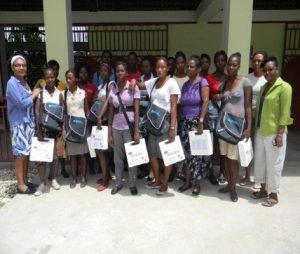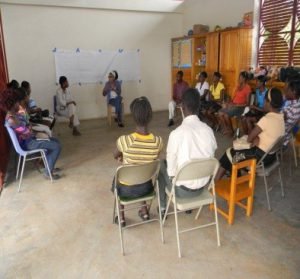
Overall Project Goal:
Create a network of Preventive Health Promoters who are trained to assist their community with basic principles of prevention, first response in case of emergency, and provision of guidance, support and advocacy for individuals in the community to access preventive and palliative care.
Objectives:
- Train a pilot group of ten (10) to fifteen (15) youth and/ or young adults in the community of Leogane on basic principles of prevention, emergency management and timely access to care
- Provide each participant with the supplies needed to fulfill their role as Preventive Health Promoters and First Respondents
- Developed a training manual for the participants
- Solicit and obtain support from health professionals residing in Haiti to provide ongoing monitoring, training, mentorship, and overall positive reinforcement of selected participants in the program
- Establish partnerships in Haiti and abroad that will support the enhancement of the project and continued success of the participants
Outcomes:
At the end of the training participants should be able to:
- Demonstrate how to take and register blood pressure, temperature and pulse
- List ways to assist in the prevention of hypertension, diabetes, and anemia
- Understand the risk associated with cigarette smoking and advocate for smoking cessation
- List some basic diseases and contamination prevention techniques (i.e. water
purification, wearing gloves, cleaning soiled areas) - Demonstrate some basic hygiene techniques (i.e. hand washing and tooth brushing)
- Understand some basic nutrition and identify some locally grown foods that could assist in meeting the basic nutrients for children
- Recognize an emergency
- List ways to prevent childhood injuries (i.e. choking, poisoning, drowning, vehicle accident/pedestrian safety)
- Demonstrate basic steps to clean a wound
- Demonstrate basic steps to immobilize a broken bone
- Understand how to advocate for a sick person if they accompany him/her to a health clinic or hospital
Cost of the program
This training program is free of charge to the eligible participants. All necessary supplies will
also be provided to the participants.
Duties and Responsibilities of the NOU LA PHPR
- Participate fully in all training sessions scheduled
- Demonstrate skills during the training
- Check Pulse and Blood Pressure for community members upon request
- Check Temperature for community members upon request
- Educate community about basic hygiene, disease prevention, contamination and what to do
- Educate community about basic health safety procedures
- Educate community about basic nutrition and food choices
- Apply basic rescue procedures in case of emergency
- Clean superficial wounds in case of emergency
- Immobilize broken bones in case of emergency
- Assist families with accessing established health facilities
- Advocate for families to receive care
- Maintain record of the tasks performed
Training Program Design and Length
The training will be conducted for a period of three and one-half day (3 ½ ). Courses will be taught along with practical applications for three (3) full days. Classes will start at 9 a.m. and end at 2 p.m. The last half a day session will be reserved for a recognition ceremony and invitation to members of the community to attend a mini health fair led by the newly trained NOU LAs.
Evaluation
- Population Satisfaction Survey
- NOU LA Survey
- Community Leaders/Community Partners Surveys
- Long-term evaluation: Impact study of influence of the NOU LA on prevention and emergency response





